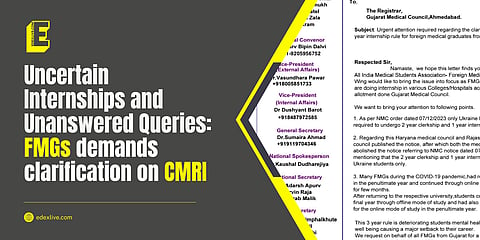

The All India Medical Students' Association - Foreign Medical Students' Wing (AIMSA-FMSW) today, May 15, demanding immediate clarification on the three-year internship rule for Foreign Medical Graduates (FMGs) from Gujarat.
In the letter, they state, "This 3 year rule is deteriorating students' mental health and financial well being causing a major setback to their career."
This appeal comes amidst a backdrop of regulatory changes, notably an order from the National Medical Council (NMC) dated December 7, 2023.
According to this order, FMG students solely from Ukraine, who have completed their final year solely via online means are mandated to undergo a two-year clerkship and one-year internship in India, as per Compulsory Rotating Medical Internship (CMRI) norms. For others, only a one-year internship suffices.
Drawing attention to this distinction, the association highlights the discrepancies in the internship requirement for FMGs in Gujarat. They state, "Regarding this Haryana Medical Council and Rajasthan Medical Council published the notice, after which both the medical councils abolished the notice referring to NMC notice dated 07/12/2023 mentioning that the 2 year clerkship and 1 year internship is for Ukraine students only."
The association, thereby, demands a similar clarification from the Gujarat Medical Council regarding the duration of their internship.
Furthermore, the association also emphasises the challenges faced by FMGs during the COVID-19 pandemic, noting that many students returned to India and continued their studies through online mode, subsequently compensating for the online mode of study upon their return to the university.
Dr Kaushal Dudharejiya, National Spokesperson and State President of AIMSA-FMSW, Gujarat, took to X (formerly Twitter) and state, "The 3 year rule is deteriorating students mental health and financial well being causing a major setback to their career."
All FMGs Association speaks
The All FMGs Association (AFA) had also sought a clarification from the medical council earlier in April this year. Dr Kaushal, the Media Coordinator of AFA, questions the rationale behind the discrimination faced by FMGs and asks, "FMGs underwent similar duration of online courses as any other Indian medical student. So, why the discrimination?"
He further highlights the cumulative impact of prolonged internships on FMGs, both financially and mentally. "This elongates their course to 10 years, that too, without proper compensation. While a two-year internship might be acceptable, why extend it to three? It's unjust, especially when Indian Medical Graduates (IMGs) are only required to complete one year of internship," he adds.
Currently, the pathway for FMGs to complete their MBBS degree stretches to a staggering eight to nine years.
The long and arduous journey of FMGs
It takes an FMG about five and a half to six years to complete the MBBS degree, followed by six months to one and a half years to pass the FMGE, and then a two-year internship.
Dr Kaushal notes that an additional year would push this timeline to a decade, a duration nearly double that of Indian Medical Graduates. "It isn't as if students immediately secure internships upon FMGE clearance. There are students who passed their FMGE in February and are still awaiting placement," he reveals, as he points out the dire shortage of internship positions, particularly in Delhi, where the demand far exceeds the available 60 seats, leaving hundreds of candidates in limbo.
The situation has prompted action from the Delhi Medical Council, which recently petitioned the National Medical Council (NMC) to permit internship training for FMGs in non-teaching hospitals, owing to the overwhelming number of interns.
Dr Kaushal also expressed concern regarding the impact of this extended duration on FMGs' mental well-being and their preparation for the National Eligibility cum Entrance Test for Post-Graduation (NEET-PG). They receive minimal stipends, and a few institutions even demand payment for internships. Are they mere labourers?" he questions, highlighting the precarious situation faced by many FMGs, who often find themselves struggling in a system that seems indifferent to their plight.
The root cause of it all?
This predicament underscores a broader issue of discrimination and neglect faced by FMGs in India, who lament being treated as second-class citizens. Dr Kaushal laments the lack of action from authorities to address these disparities, questioning the underlying reasons behind such discrimination.
The media coordinator points out that the difference between Indian Medical Graduates and FMGs often boils down to a mere difference of 10 or 20 marks, and further, most students pursue medical education abroad due to its affordability compared to private medical colleges in India.
"The authorities emphasise the importance of practical knowledge, but the lack thereof is not exclusive to FMGs," he argues.
FMGs' practical knowledge has been questioned mainly because they were affected by the pandemic and also thwarted into unavoidable situations where they had to pursue online classes for a period of time.
Dr Kaushal points out a stark example: the absence of a campus for the All India Institute of Medical Sciences (AIIMS), Madurai, leading to students being relocated to another institution. "No one would dare to question AIIMS Madurai's practical knowledge now, as it would cast doubt on their own competence," he observes.
As the AIMSA-FMSW and AFA call to action, seeking a clarification notice from the Gujarat Medical Council to address the issues, the medical council is yet to respond. Meanwhile, the clock ticks relentlessly for FMGs, adding to the burden of completing an undergraduate degree.
